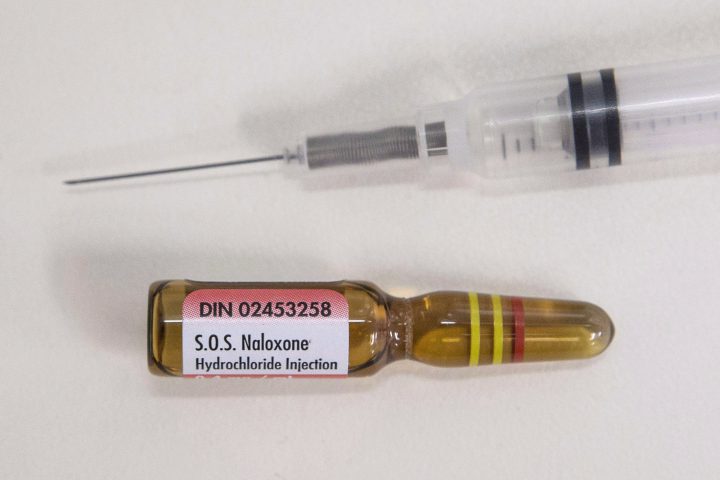Manitoba announced the use of millions of dollars over the past week toward community safety by addressing addiction prevention and harm reduction. Organizations say it is “a start,” but more help is needed.

The St. Boniface Street Links Outreach and Supportive Intervention for People Who Use Substances (OASIS) Mobile Outreach Project will receive $215,000, the province announced last Tuesday.
Marion Willis, St. Boniface Street Links’ founder, told Global News that there needs to be a co-ordinated plan to fight substance use and homelessness in Winnipeg.
“Just harm reduction on its own is not going to change anything. Just outreach on its own cannot change anything,” she said.
The organization also operates Morberg House, a 12-bed transitional residence for men experiencing harm related to substance use, homelessness and mental health challenges. Willis said the funding will allow them to expand services to include recovery support for women.
Manitoba is also spending $390,000 to expand services and increase capacity at Rapid Access to Addictions Medicine (RAAM) clinics across the province.
The clinics give patients a variety of addiction and health supports in one place.
“(The funding) is a clear demonstration that the province realizes, understands we need to start addressing these challenges in a significant way and that we need to move the needle away from just talking about homelessness to start talking about the root cause, which is this drug addiction,” said Willis.
“I’m hopeful and rather optimistic. I must say that this is really the beginning of investments by the province.”
There are currently six RAAM clinic locations in Manitoba: two in Winnipeg and one in Brandon, Thompson, Selkirk and Portage la Prairie.

Get weekly health news
Manitoba also bumped up its annual support for shelters and transitional housing programs by $9 million and provided $3.6 million to Downtown Community Safety Partnership (DCSP).
The DCSP is a collaborative community initiative launched in 2020 to create a safer, more inviting downtown Winnipeg for businesses and residents.
“As we hire more staff with this funding that we just received, we’ll be able to sort of increase the amount of people that we’re helping finding housing, the amount of people that we’re able to engage with on the street, the amount of encampments in the downtown area that we’re able to sort of check in on,” said Matthew Sanscartier, Business Intelligence Analyst, DCSP.
Expanding low-barrier programming for people who need it most is a good first step, according to Sanscartier.
“We’re pretty happy with where that money is going. Would we like to see more in the future? Absolutely. But yeah, it’s a good first step in terms of kind of bolstering the resources that we have downtown to help people who need to be connected with those services.”

The organization will also be receiving an additional $175,000 from the government to acquire a van capable of transporting people with disabilities and mobility needs.
The van will be used to take people to shelters, medical appointments, social services and probation appointments.
“Challenges that we see there is, for example, if someone is banned from multiple shelters for various reasons that I won’t go into, our folks work tirelessly to make sure that they do find a place to stay, even if that means driving them out to Portage La Prairie,” Sanscartier said.
However, while harm reduction and prevention is a good first step, the city desperately needs more addiction recovery resources, according to Willis.
“Is it enough? Absolutely not,” she said. “We need to develop a recovery model in this city, in this province that is a better match to the addiction challenges that we face.”
“What does that look like? Well, our 28-day treatment programs in Winnipeg are no match to drug addiction recovery.”
Recovery is a long journey that requires about two years, in Willis’s opinion.
“I expect the overdose death rate this year to exceed 500. It’s horrific. The number of people that are overdosing and dying.”
A spokesperson for Mental Health and Community Wellness Minister Sarah Guillemard told Global News the province is committed to developing a recovery-oriented system of care that includes evidence-based supports through prevention, early intervention, treatment and recovery, and a continuous pursuit of recovery for individuals with substance use and addictions issues.
“We are investing in core addictions services so when Manitobans are moving forward on their recovery journeys, they have the services and supports they need. We are also focused on learning what model of harm reduction works best for Manitobans, and are analyzing the outcomes and risks of various harm reduction initiatives and reviewing approaches used elsewhere,” they said.
“Manitoba Mental Health and Community Wellness continues to work with other government departments, Shared Health, regional health authorities and community agencies to examine opportunities to address gaps in services and supports.”
Other prevention and harm reduction steps the government has taken include $210,000 towards the province’s free Take-Home Naloxone Kit Program.
And a pilot program supporting access to Narcan will be getting $200,000 to allow people at risk of opioid toxicity and overdoses to receive Narcan from participating pharmacies at a significantly reduced price.
— With files from Global’s Rosanna Hempel.












Comments
Want to discuss? Please read our Commenting Policy first.